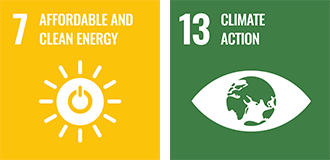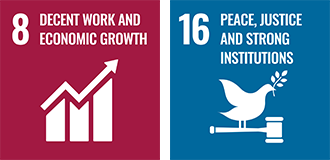Strategy and objectives
Ethics, integrity and responsibility are the guiding values in all our activities, in respect for people, the environment and the company as a whole
Driven by the desire to pursue responsible development of our business, we have defined an integrated strategy able to combine business growth and financial solidity with the principles of social and environmental sustainability, creating long-term value.
Sustainable growth, enhancement of human capital, reduction of direct and indirect environmental impacts and attention to social issues are the four areas of responsibility in which we have incorporated targets and projects for the responsible development of the group and our stakeholders.
In order to effectively incorporate the four strategic areas in all our activities, we have employed specific group policies.
The Group Sustainability Policy was created with the objective of governing our direct impacts, by identifying the roles, responsibilities and priority sustainability issues. Based on the 10 principles of the Global Compact, the Policy applies to all group companies, by integrating with all other guidelines, procedures, directives and provisions connected with the areas identified.
The priority themes of the Policy
The Group ESG Policy was drafted with the objective of effectively managing our indirect socio-environmental impacts, thanks to the integration of environmental, social and governance (ESG) criteria in our financing, investing and advisory model.
We want to build a responsible business, that integrates sustainability principles and objectives in all business activities. Policies and objectives, governance system, dialogue with stakeholders and adhesion to the Global Agenda form the basis of our commitment. In line with this commitment, we have defined some qualitative and quantitative objectives being set in the Strategic Plan 2023-2026 guidelines and included in the staff performance evaluation and remuneration policies for the Group’s entire corporate population and senior management in particular.
The targets identified, involve the following main topics:
Environmental

- Net Zero financed emissions by 2050
- 35% financed emissions intensity by 2030 (-18% by 2026))
- Interim sector targets for Net Zero Banking Alliance released by 20241
- Phase-out from coal by 20302
- Carbon neutrality on own emissions
- 100% renewable energy at Group leve
- Incorporating more “Climate & Environment” metrics into risk management processes such as RAF, ICAAP and Stress testing
- At least 2 Sustainability bond issues
1) No exposure to coal mining and agriculture. Four sector targets published by September 2023 (Automotive and Power already published; Cement and Aviation will be added). The remaining NZBA sectors will be disclosed by September 2024
2) In CIB lending (excluding Specialty Finance) and proprietary investment portfolio in all markets
Social

- >30% female members of MB Key Function Holders3
- >20% female executives
- >50% women out of total hires
- Parity in advancement rate
- 100% employees trained in ESG
- >€20m support to projects with social and environmental impact
- Stop lending to/investing in tobacco2
- 70% of procurement spending screened using ESG criteria
2) In CIB lending (excluding Specialty Finance) and proprietary investment portfolio in all markets
3) Key Function Holders: Group senior management
Governance

- Long-Term Incentive Plan featuring::
- 50% of total variable compensation (vs previous @20%) for Group CEO and General Manager delivered all in equity
- Extended to include other key Group strategic resources
- 20% assigned to ESG KPI weighting4
- Launch of the first Employee Share Ownership Plan to foster engagement and ownership at all levels
- Full adoption of Tax Control Framework for all the Group Italian banks
4) Two proposed KPIs to be included in the 2026 LTI: % of female executives; reduction in financed emissions intensity
The Plan objectives will be pursued by offering solutions, products and advisory services to support clients in the transition towards a sustainable economy, helped by training programmes and awareness-raising campaigns to promote increased sensitivity to ESG topics both within and outside the Group.
ESG product/service offering differentiated by business line
|
Wealth Management |
Consumer Finance | Corporate & Investment Banking |
|
|
|
1) % of ESG qualified funds (SFDR Articles 8&9 funds) out of total funds in clients’ portfolio
2) Number of ESG qualified funds (SFDR Articles 8&9 funds) manufactured by the Group Asset Managers
3) Cumulated figures over the 1 July 2023- 30 June 2026 period
ESG culture
|
≥35 million emails containing tips on green/financial education sent to clients by Compass
|
Engagement with clients to assist them in their decarbonization pathway
|
| SDG | AREA | OBJECTIVES TO 2023 | 30/06/2023 |
|---|---|---|---|
 |
Quality education |
Training hours: up 25%, to enhance employees’ competences | Up 49% vs 30/6/19 |
 |
Gender diversity | Approx. 50% of female candidates to be considered for new hirings | Procedures implemented and new quantitative targets identified to FY 2026-27 and to FY 2030-31 |
| All suitable female candidates to be considered for internal promotions | |||
 |
Responsible investing | AM: 100% of new investments screened using ESG as well as financial criteria | 100% |
| 40% of total affluent1 clients’ portfolios now invested in qualified ESG funds (SFDR Article 8/9)2 | +66% | ||
| Contributing to growth | €700m to be invested in outstanding Italian SMEs | €480m invested | |
 |
Support to local community |
€4m per year in projects with positive social/environmental impact | Over €6.5m in FY 2022-23 |
| MB Social Impact Fund: AUM increase ≥ 20% | AUM up 23.5% versus 30/6/19 | ||
 |
Sustainable procuremen | 40% of procurement expenses screened using ESG criteriat | 62% of procurement expenses screened using ESG criteria3 |
| Clients | Customer satisfaction:
|
CSI @81, NPS @47 CSI @90.6 NPS @66 |
|
 |
Reducing direct impact on environment |
94%7 energy from renewable sources |
100% energy from renewable sources |
| 11%8 reduction in CO2 emissions | CO2 emissions down 17% | ||
| Hybrid cars @72% 9of the Mediobanca Group’s float in Italy | 41% of hybrid cars | ||
| Supporting transition to clean energy | Green bond issued: €500m | Issued a Green Bond and a Sustainability Bond for €500 mln each | |
| RAM: carbon neutral to be issued | RAM Stable Climate Global Equities carbon neutral fund issued | ||
| Mediobanca Premier green mortgages up 50% | Green mortgages up 80% versus 30/6/22 |
1. Affluent segment: deposits between €50,000 and €500,000.
2. Target revised upwards from the original (30% of client portfolios to consist of ESG products) which was comfortably achieved, even following the introduction of the SFDR obligations.
3. Suppliers that have completed the CSR section of the form contained in the Group’s List of Suppliers. This involves merely recording information which does not affect the choice of supplier when decisions are made regarding them.
4. Premier, i.e. clients in the affluent (with deposits of between €50,000 and €500,000k) and the Wealth Management segment (deposits >€500,000).
5. CSI and NPS revised upwards versus original targets: CSI (Customer Satisfaction Index) @73, NPS (Net Promoter Score) @25.
6. NPS revised upwards versus original target: NPS @55.
7. Target adjusted from the original (92%).
8. For Scope 1 + Scope 2 Market-based, named users. Target adjusted from the original (15%) because of delays in the delivery of hybrid vehicles and the use of fuel cards being extended to the entire commercial segment and car fleet.
9. Target adjusted from the original figure of 90% due to delays in the delivery of electric and hybrid vehicles as a result of first the pandemic then the war.







